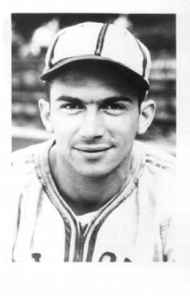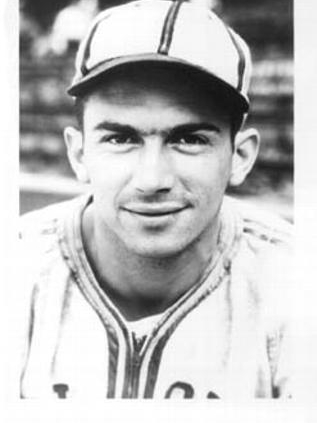June 5, 1942: Dick Fowler goes the distance for A’s in tough-luck marathon
 The nation’s eyes were turned westward on a June Friday morning, toward a small island 1,300 miles northwest of Honolulu, as the Battle of Midway was underway. After attacking Pearl Harbor six months earlier, the Japanese Imperial Fleet dominated the Pacific Ocean with intentions of now destroying the remaining US Pacific Fleet near Midway Island.1 Front pages across the country carried reports of the initial Japanese air attack on Midway and the American response, which included damaging a Japanese battleship and an aircraft carrier. Light damage was reported on Midway Island with both sides expecting continued attacks in the coming days.2
The nation’s eyes were turned westward on a June Friday morning, toward a small island 1,300 miles northwest of Honolulu, as the Battle of Midway was underway. After attacking Pearl Harbor six months earlier, the Japanese Imperial Fleet dominated the Pacific Ocean with intentions of now destroying the remaining US Pacific Fleet near Midway Island.1 Front pages across the country carried reports of the initial Japanese air attack on Midway and the American response, which included damaging a Japanese battleship and an aircraft carrier. Light damage was reported on Midway Island with both sides expecting continued attacks in the coming days.2
Looking eastward, the Philadelphia Athletics hosted the St. Louis Browns in the first of a four-game series at Shibe Park. Philadelphia was a perennial tail-ender; the team endured a last-place finish in 1941, ending the season with a 64-90 record, 37 games behind the AL pennant-winning New York Yankees. The team finished in the basement in 1940 as well, and had finished either last or next to last every year since 1935. The 1941 Athletics were led by outfielders Sam Chapman (team-high .921 OPS) and four-time AL All-Star Bob Johnson (.863 OPS, team-high 652 plate appearances), and first baseman Dick Siebert (team-high .334 batting average, fifth in the league). The pitching included Phil Marchildon, whose 3.57 ERA in 204⅓ innings led the team, and Jack Knott, who led the A’s with 13 wins and had a 4.40 ERA in 194⅓ innings.
The Athletics were not expected to compete for the pennant; The Sporting News predicted a last-place finish, just behind the Browns.3 Although President Franklin D. Roosevelt declared that major-league baseball should continue during wartime, the Athletics lost nine players to the armed services between the 1941 and 1942 seasons,4 including Chapman, who joined the U.S. Navy in late 1941 and became a flight instructor.5 Attempting to improve his patchwork infield, legendary Athletics owner Connie Mack promoted 6-foot-3 Jack Wallaesa, who was the tallest shortstop to play major-league ball at the time. Mack commented, “He’ll never be a great hitter but he’ll do enough with the bat.” During spring training, Wallaesa started as a right-handed hitter, then Mack turned him into a switch-hitter.6
The Browns finished the 1941 season with a 70-84 record, tied with the Washington Senators and just ahead of Philadelphia. St. Louis started the season solidly, winning the first four games. After absorbing their first loss to the Detroit Tigers, the Browns rebounded with a 2-1 win in the first game of a doubleheader. St. Louis lost the nightcap, and then lost the next eight games to drop into seventh place. They finished April with a 7-11 record, then improved with a 16-13 May record. Preceding the four-game series with Philadelphia, the Browns won two of three in Washington.
Connie Mack sent 21-year-old rookie Dick Fowler to the hill for the night game. Fowler, who had pitched in four games the prior season, was 1-1 with a 7.18 ERA in 26⅓ innings. He struggled early as his opponents batted .302 against him, and he struck out only eight of the 112 batters he faced. In his most recent appearance, five days earlier, he tossed a scoreless ninth inning against the Yankees, but had been charged with at least four earned runs in each of the three previous appearances. Mack noted in spring training that “Fowler and [Fred] Caligiuri, after showing so much promise last fall, have been hit very hard this spring.”7 Fowler’s pitching repertoire included a fastball, change, curve, and fork-slider.8
Johnny Niggeling, the Browns’ starting pitcher, was a 38-year-old veteran of two nearly full major-league and 10 minor-league seasons. Niggeling toiled in the minors from 1929 with the Waterloo (Iowa) Hawks of the Class D Mississippi Valley League through 1939 with the Indianapolis Indians of the American Association. He made his major-league debut on April 30, 1938, when he pitched ⅓ inning for the Boston Bees. A knuckleballer,9 Niggeling had started eight games through May, going 5-3 with a 2.69 ERA and 34 strikeouts in 67 innings. He was riding a four-game winning streak, all complete-game victories, heading into the matchup.
St. Louis leadoff hitter Don Gutteridge struck out to start the game, Harlond Clift flied out, and George McQuinn grounded out. Philadelphia leadoff hitter Mike Kreevich struck out, then Pete Suder and Dick Siebert hit popups as Niggeling matched Fowler’s one-two-three inning. In the second and third, both teams placed one runner on base in each frame but posed no scoring threat.
In the fourth inning, McQuinn walked. Wally Judnich grounded out to first and first baseman Siebert attempted to throw out McQuinn at third base. Siebert’s throw hit McQuinn squarely in the back,10 and McQuinn reached third base. He was stranded as the next two batters grounded out. In the bottom half, after Niggeling struck out Suder and Siebert, Johnson walked and Elmer Valo singled, but Bob Swift popped out to the second baseman.
As both starters established their rhythm, the fifth and sixth innings passed quickly. The only runner reaching scoring position was the Browns’ Rick Ferrell in the fifth. In the sixth inning, Fowler retired St. Louis in order and Niggeling allowed a harmless walk with two outs.
In the seventh, the Browns’ Chet Laabs and rookie Vern Stephens flied out to center. Tony Criscola singled but was caught stealing by Swift. Swift led off the bottom half with a single to left and went to second when left fielder Criscola booted the ball.11 Buddy Blair walked and Crash Davis’ sacrifice moved the runners up. For the first time, Niggeling faced a real threat with runners at second and third base and just one out. But pitcher Fowler grounded to shortstop Stephens, who fired home and caught Swift in a rundown for the second out. Then Kreevich hit a force-play grounder for the third out. Neither team advanced a runner past second base in the eighth or ninth, so the teams ended regulation scoreless. Through nine innings, Fowler had allowed five hits and two walks while Niggeling gave up five hits and four walks. Only four baserunners had reached third base.
Fowler continued his dominance in the 10th inning, allowing a Criscola leadoff single before retiring the side on a bunt groundout, an infield groundout, and a strikeout. In the Athletics’ 10th, Kreevich singled to center with one out and Siebert singled to center with two outs, advancing Kreevich to third. The Athletics again fell short when Johnson grounded out to third base. Each pitcher allowed a baserunner in the 11th and 12th, though no baserunner proceeded into scoring position.
Both teams were now batting around for the sixth time. In the Browns’ 13th inning, Fowler allowed a harmless walk. In the bottom of the inning, George Caster was summoned from the Browns’ bullpen. The Athletics again threatened with runners at first and second with two outs, but Davis hit a popup. Both teams went one-two-three in the 14th inning. In the 15th, the Browns got two runners on base for the first and only time in the game when Gutteridge and Clift both singled. But with two outs, McQuinn grounded out and stranded the runners. Then Caster set down the Athletics on two groundouts and a fly out.
Judnich, who had reached the outfield once in his previous six appearances,12 started the 16th inning with a soaring triple off the corrugated right-field wall.13 Laabs was out on a liner to center field that Kreevich “caught off his shoetops.”14 Judnich tagged up and beat the throw home, scoring the first run of the game. Stephens, who was hitting .300 but went 0-for-7, grounded out and Criscola flied out.
In the bottom of the inning, Caster toughened and retired the Athletics on two foul popouts to Browns catcher Ferrell and an infield groundout to end the marathon game, which lasted 3 hours and 7 minutes.15
Fowler, who went all the way for the Athletics, fell to 1-2, though his ERA dropped by 2.50 runs, 7.18 to 4.68. He finished 1942 with a 6-11 record and a 4.95 ERA in 140 innings. By innings played, the game was tied for the longest AL game in 1942 and the majors’ longest night game to that point;16 the Browns defeated the Athletics 5-4 in 16 innings on September 14. The Athletics reached sixth place for one day the following week, but dropped into seventh place the following day and the basement for the remainder of the season on July 23.
SOURCES
Besides the sources cited in the Notes, the author consulted Baseball-Almanac.com, Baseball-Reference.com, and Retrosheet.org.
NOTES
1 Williamson Murray and Allan R. Millet, A War To Be Won: Fighting the Second World War (Cambridge, Massachusetts: The Belknap Press of Harvard University Press, 2001), 192-195.
2 United Press, “Jap Battleship, Carrier Smashed as Midway Repulses Air Attack,” Philadelphia Inquirer, June 5, 1942: 1; Associated Press, “U.S. Forces Battle Strong Jap Fleet After Midway Raid,” St. Louis Post-Dispatch, June 5, 1942: 1.
3 J.G. Taylor Spink, “Looping the Loops: It’s Their Start – And our Finishes,” The Sporting News, April 9, 1942: 1.
4 United Press, “Athletics Face Tough Summer in Their Loop,” Republican and Herald (Pottsville, Pennsylvania), April 1, 1942: 8.
5 “Sam Chapman,” Gary Bedingfield’s Baseball in Wartime, baseballinwartime.com/player_biographies/chapman_sam.htm. Accessed October 17, 2018.
6 Stan Baumgartner, “A’s String Along with String-Bean Wallaesa, Longest Player at Short in Majors’ History,” The Sporting News, April 9, 1942: 2.
7 Connie Mack, “Pitching Has Upset Plans for ’42 A’s, Connie Admits,” Philadelphia Inquirer, April 8, 1942: 31.
8 Bill James and Rob Neyer, The Neyer/James Guide to Pitchers: An Historical Compendium of Pitching, Pitchers, and Pitches (New York: Fireside Books, 2004), 210.
9 James and Neyer, 325.
10 Stan Baumgartner, “Browns Conquer Athletics, 1-0, in 16 Innings,” Philadelphia Inquirer, June 6, 1942: 25.
11 Stan Baumgartner, “Browns Conquer Athletics,” 25.
12 Stan Baumgartner, “Browns Conquer Athletics,” 23.
13 Associated Press, “Browns Win in 16th, 1-0,” Pittsburgh Post-Gazette, June 5, 1942: 13.
14 Stan Baumgartner, “Browns Conquer Athletics,” 23.
15 Game summary and Box score, The Sporting News, June 11, 1942: 8.
16 Dick Farrington, “Browns Do Tricks at Sewell’s Bidding,” The Sporting News, June 11, 1942: 5.
Additional Stats
St. Louis Browns 1
Philadelphia Athletics 0
16 innings
Shibe Park
Philadelphia, PA
Box Score + PBP:
Corrections? Additions?
If you can help us improve this game story, contact us.


